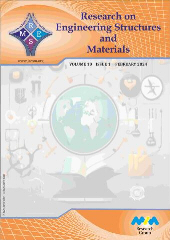The International Journal of Research on Engineering Structures and Materials (RESM) aims to be a forum for the discussion, development and dissemination of the technical and scientific knowledge in related areas. The term "Structure" in the title is used in a broad sense to include all engineering "systems" in the scope.
The researchers, professionals and practitioners in the following areas are expected to mainly contribute and benefit from the journal:
- Material Engineering
- Mechanical Engineering
- Structural Engineering
- Earthquake Engineering
- Energy (focus on renewable)
- Nano-technology
- Biomechanics and Biomimetics
- Enviroment (material and engineering system related issues)
- Computer Engineering and Data Science (material and engineering system related issues)
Research on Engineering Structures and Materials (RESM) publishes theoretical and experimental studies on the below stated topics. Theoretical studies are encouraged to be supported by experimental results where it is suitable. State-of-the-art papers that elucidate the current point and the advancement of special subjects are welcomed. The journal is open for short communications and technical notes that allow researchers to disseminate their findings which can be expressed in a compact manner. Discussions of papers are also published to provide accuracy and better understanding of the scientific knowledge. Submission of papers from professionals and practitioners is encouraged.
Topics of special interest include (but not limited to):
- Material science (structure and properties of concrete, metals, ceramics, composites, plastics, wood, etc.)
- Performances of new and existing buildings and other structural systems
- Design of buildings and other structural systems
- Seismic behavior of buildings and other structural systems
- Repair and strengthening of structural systems
- Case studies and failure of structural systems
- Safety and reliability in structural and material engineering
- Earhquake engineering related aspects of geology, seismology and geological engineering
- Mechanical behavior of structures, machines and mechanical systems
- Architectural aspects of structures related to structural engineering
- Vibration, impact loadings and structural dynamics
- Mechanics of materials (elasticity, plasticity, fracture mechanics)
- Use of new and innovative materials and techniques in energy systems (focus on renewable energy)
- Mechanical aspects of biological systems (Biomedical engineering and Biomechanics including Biomimetics)
- Nano technology and nano-materials
- Material and engineering system related aspects of enviromental issues
- Material and engineering system related aspects of artificial intelligence
- Modelling, solution and control methods such as fuzzy logic, neural networks, genetic algortihms, particle swarm optimization, ant colony, etc. in engineering problems

